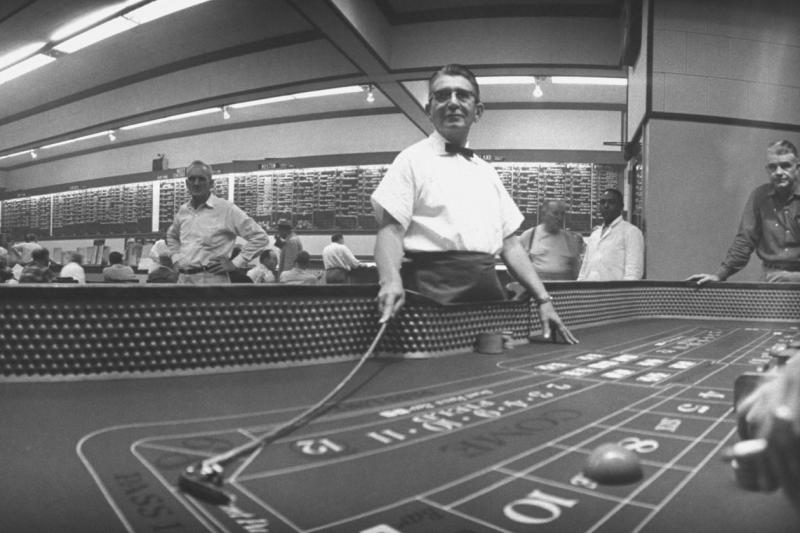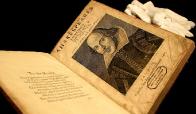'The Vapors' Review: High Rollers in Hot Springs - WSJ
By: Dave Shiflett (WSJ)



Among the various sources of hope—religion, lottery tickets, discount liposuction—few can clean out a bank account quicker than a night at the casino. A vignette from David Hill’s “The Vapors” makes the point. It was Easter Eve, 1964, the final night of operation for the Vapors, a top-drawer casino in Hot Springs, Ark. Jerry Van Dyke was the night’s entertainment, but the main draw was a last shot at gambling glory. One eager customer burned through a stack of $25 chips, followed by five $100 bills. Undeterred by his lunge toward insolvency, he reached for the family checkbook. His wife suggested it was time to leave. “Honah,” he said, in words captured by a reporter from the Saturday Evening Post, “weah not goin’. ’Cause after tonight, it’s all ovah.” One assumes he would have traded the missus for a line of credit had the option been available.
Such was the spirit that made Hot Springs a hotbed of gambling and related “vice,” according to Mr. Hill, a Hot Springs native and journalist. J. Edgar Hoover, who knew vice inside-out, believed that “Chicago in its Capone era didn’t have a thing on Hot Springs.”
Mr. Hill’s fascinating portrait of Hot Springs in its heyday covers 1931 through 1968 and includes many of that era’s rogues and A-listers: Meyer Lansky, Liberace, Babe Ruth, Fidel Castro, and even Bill Clinton and his mother, Virginia. (Other relatives owned the local Buick dealership.) But much of the story is told through the lives of three lesser mortals: Owney Madden, a New York gangster who had owned the Cotton Club in Harlem before heading south to Hot Springs; Dane Harris, a local entrepreneur who became the city’s unofficial gambling czar; and Mr. Hill’s grandmother Hazel, whose luck in Hot Springs toggled between bad and abysmal.
Madden, Mr. Hill tells us, had helped launch the careers of Duke Ellington and Mae West. He also did nine years in Sing-Sing for killing a gang rival and one more year after Madden’s hired gun ventilated a competitor with 60 bullet holes. But the dapper expatriate Brit was also respected in the wider world. “When you wanted anything in New York,” Ed Sullivan said, “you saw Owney Madden.” His pursuit of the American dream, and desire to exit New York, took him to Hot Springs in the early 1930s. He married the postmaster’s daughter and teamed up with Dane Harris, who had high hopes for the evolving gambling scene. Before it was over, some five million annual visitors wagered hundreds of millions of dollars in the town’s casinos. Not bad for an industry that was, legally speaking, illegal.
Mr. Hill depicts a town that was a warm home to Baptists and heathens alike, with the more accomplished of the state’s political leaders appealing to both groups simultaneously. Gov. Orval Faubus, backed by evangelicals and a liquor magnate, proved adept at receiving both communion and bribes. Other notables with greased palms included Arkansas Sen. John McClellan, whose Senate Select Committee on Improper Activities in the Labor or Management Field was investigating gambling interests. Madden and Harris bought the senator’s wife a new Buick and ordered 15,000 copies of his book, “Crime Without Punishment.”
Despite the slippery political atmosphere, Hot Springs couldn’t escape the era’s social friction. Racial tensions rose after Faubus sent National Guard troops to stop the integration of Little Rock’s public schools. Anti-gambling reformers, who rarely rested, found a powerful ally in U.S. Attorney General Robert Kennedy, whose relentless investigations sent Madden into a divine funk. “Jesus, Mary and Joseph,” he complained. “I was in partnership with his father back in the bootlegging days. How could he do this?”
Mr. Hill is dismissive of Baptists and other “Bible belt simps” but has deep sympathy for his long-suffering grandmother. Hazel Hill got a rough start when her father, a horse trainer, sold his car to a local yokel and left town. Hazel, then 16, was part of the deal. She was soon married and descended into drug and alcohol addiction, her husband eventually graduating to drinking after-shave and turpentine before drowning in a lake. Hazel worked odd jobs, some in the casinos, and often found little time for parenting.
Mr. Hill tells a lively tale, reminding us that it’s a lot more fun reading about vice than virtue. Minor characters include a bootlegger who took an order from a group of prisoners, then broke into jail to deliver the goods. In Las Vegas, a hitman made a name for himself with his blowtorch and decapitation skills. Jack Ruby wanders into the story, having entertained Hot Springs bigwigs at his nightclub in Dallas.
The Vapors, named for the steam that rose from local hot springs, opened in 1960. It boasted 80 slot machines and an array of gaming tables, plus an entertainment lineup that included Mickey Rooney, Phyllis Diller and the Smothers Brothers. Bill Clinton’s mother loved the Vapor vibe, but Bill (then a teenager) didn’t feel “comfortable” the night she brought him along and went home early.
As it happened, the casino’s discomfort level would soon go through the roof. In January 1963 it was bombed, leaving one person dead and 14 injured. Harris’s house was later blasted, and he grew weary of dishing out upwards of $30,000 a month in bribes. Meanwhile, Kennedy was keeping up the heat, and Faubus declared a gambling shutdown. It was curtains time.
When the final revelers exited the Vapors on Easter morning, 1964, they encountered a horde of Baptists singing “The Old Rugged Cross.” The town was changing. Liquor by the drink was banned. Hazel ran off with a carnival man, and the Vapors, after housing a series of failed ventures, was resurrected as a church.
Mr. Shiflett posts his original music and writing at Daveshiflett.com.



